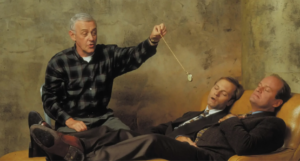There’s a certain type of British festival, where middle-class, middle-aged parents relive the glory days with their children in tow. It’s all cult bands from the Nineties, craft ales, and fairy lights in the broadleaved woodlands to make the walk to the campsite both pretty and safe. Kids’ activities might include pottery workshops or forest play — and they’re led by an enthusiastic couple whose nose piercings and tattoos are offset by the comforting knowledge that they’re fully trained, and DBS checked. Mum and Dad can go off to the wood-fired hot tub for an hour and know that their children will emerge unscratched by sticks and enriched by the important experience of playing with them.
This is the 21st-century vision of play: it’s safe, organised, educational, always supervised by adults. And it might have killed off what we used to think of as play: kids running around whatever space they could find, improvising unpredictable games and creating social worlds unfathomable to their parents.
Children are far less free than they used to be. While 71% of Boomers and 80% of Gen X recall playing in the street as children, only 27% of children do today. And last week, MPs heard evidence in an inquiry into how the built environment restricts children’s independence, with charities warning that a lack of outdoor play is very bad for their development.
In urbanised environments, where land is at an all-time premium, finding a place to run around can be a challenge. One in eight children don’t have a garden and nearly 800 playgrounds have closed in the past decade. But this doesn’t account for the precipitous collapse of playing on the street, when roads are more regulated and safer than ever before. Nor does it acknowledge that there are still 16,000 playgrounds maintained by local authorities in the UK, and 27,000 parks. There must be some other factors at work.
Having a child is generally perceived as harder than it used to be. In three quarters of families in which the parents are together, both of them work. And childcare costs have risen precipitously. There has been an attendant boom in helicopter parenting, with couples more focused than ever on the details of their kids’ development. Their aim is to optimise their lives — and excise all bad externalities.
But this safetyist instinct does have blind spots. While parents might be grilled in A&E if they bring in their child with a minor injury from climbing a tree; nobody tells you off for parking your toddler on the iPad for half an hour that turns into half a day. If your kids are a bit pallid from spending more time online than outside, that’s accepted as normal. Safeguarding culture is obsessed with preventing tangible, acute injuries such as cuts and bruises, but the slower chronic harms that emerge over years are often ignored — even though we know, and lament, that children are increasingly less physically and mentally healthy.
At the heart of this issue is whether children are free to exercise their instincts. Dutch cultural theorist Johan Huizinga saw play as primal: just like any other young animal, children have an intrinsic drive to play, and don’t need to be taught how to do it. Huizinga defines play as an act of self-directed freedom. It can only really happen when children are left to their own devices, which requires parents to ignore them.
To modern helicopter parents, this can feel counterintuitive. We are increasingly uncomfortable about our children’s discomfort: the influence of safetyism can be seen in how we approach their emotional lives as well as their corporeal ones. Parents worry that boredom is bad — when actually, it is an important learning experience. It’s a transitional space in which the child realises that she needs to do something differently. She might then try to attract a parent’s attention. If she doesn’t get it, she gets fractious; if she is still ignored, she eventually finds something else to do. If we leave that novelty-seeking impulse to develop, it turns into creativity. It just needs time.
This is increasingly difficult, though, now that we all have distraction machines in the palms of our hands. Most adults won’t choose the disgruntlement of boredom over the abundance of synthetic novelties on offer online — which makes it hard to admonish a child for seeking the Xbox or the iPad rather than inventing their own forms of entertainment.
And it’s true that when play involves temporary social orders, it brings discomfort with it. Playing out in the street means muddling along with whoever else is out there; it means trying — and often failing — to assert one’s role in an emergent group, which might be big, and include kids who are taller and older and cleverer. When children play structured games, whether it’s hide and seek or a ball game or soldiers fighting in the trenches, they have to abide by the rules of engagement — and deal with losing.
In other words, play is a good warm-up for life. But, crucially, it doesn’t take place for material or real-world gain. The goals exist outside of the goals we ordinarily strive for, and they evaporate. Kids need to be emotionally committed enough to want to win, but not so invested that they kick off when they don’t. At a time when children spend years of their lives being examined and graded in school, there’s benefit in both learning to strive and learning to let go.
True play also teaches kids how to deal with uncertainty. So argued the French sociologist Roger Caillois, who built on Huizinga’s theory, emphasising that play isn’t predetermined, but animated by chaos. Hence why play necessarily comes with risk. Now, children are far more likely to engage in a sort of pseudo-play, either in the form of online games, which are pipelines of reliable and predictable dopamine hits, or educational games, which are led by the parent or teacher rather than by children themselves, and where the goals are geared towards real-world pedagogical gain. Whereas Huizinga argued that play happens outside of ordinary life — and is therefore a kind of anarchy — pseudo-play conforms entirely to conventional structures, whether it’s the gaming-industrial complex or the lifestyle capitalism promoting Important Experiences.
The forest schools and educational toys and tasteful wooden games that sneakily give kids lessons about biodiversity or engineering or maths may be wholesome, even captivating, but they’re anything but self-organising. We see this in the adult world of play, too. A festival was once a break from normal social order — a temporary, wild otherworld. Now, it’s a luxurious curated experience. Whereas play, for Caillois, was “an occasion of pure waste: waste of time, energy, ingenuity, skill, and often of money”, now, everything has to be optimised. But what happens when we’re not allowed to be wasteful? When all our earliest memories are goal-oriented, outcome-focused, organised?
A therapist friend who works with students at a nearby high-performing university observes that they often arrive burnt out and depressed. He’ll ask them what is meaningful to them, what their vision of a better life would be. They’ll go silent, confused. Deciding that, surely, is his job? Their motivation for going to therapy isn’t to find meaning — it is the knowledge that you need to look after your mental health in order to be productive. His strategy is to be playful with them, which rattles them at first, but they soon soften into it. Their thinking relaxes, and they start to find new avenues out of their malaise.
Play, then, is an essential part of growing up — and, later, of life. For Huizinga, play was a sign of the “mind breaking down the determinism of the cosmos”, of a person forging their own path. Hence why play is getting harder: the techno-capitalist society we currently inhabit militates against autonomy; if people are to be interchangeable units of labour in a bigger machine, they have to do as they’re told. And so it sets out clear performance indicators for us, a tick-list of achievements in our roles as children, parents, workers and social beings, from which deviation feels like failure.
If we lose autonomy, we tend to lose faith in ourselves. For parents, this can manifest as fear: what if my child is unhappy, what if they get hurt, what if I haven’t done enough for them? Letting go is the best way to point children towards the path to a fulfilling life. Providing space for them to play isn’t just about parks and gardens — it’s about knowing when to trust them to work things out for themselves, and to cope when things go wrong.
Disclaimer
Some of the posts we share are controversial and we do not necessarily agree with them in the whole extend. Sometimes we agree with the content or part of it but we do not agree with the narration or language. Nevertheless we find them somehow interesting, valuable and/or informative or we share them, because we strongly believe in freedom of speech, free press and journalism. We strongly encourage you to have a critical approach to all the content, do your own research and analysis to build your own opinion.
We would be glad to have your feedback.
Source: UnHerd Read the original article here: https://unherd.com/




